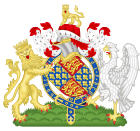Statute of Provisors facts for kids
| Act of Parliament | |

|
|
| Long title | The King and other lords shall present unto benefices of their own, or their ancestors foundation, and not the bishop of Rome. |
|---|---|
| Citation | 25 Edw. 3. Stat. 4 |
| Other legislation | |
| Repealed by | Statute Law Revision Act 1948 |
|
Status: Repealed
|
|
The Statute of Provisors was an important law made in England around 1350. It was created during the reign of Edward III. This law was about who had the right to choose leaders for churches.
For a long time, there was a big disagreement. The English kings and the Pope (the leader of the Roman Catholic Church) argued over who could pick people for important church jobs. These jobs were called "benefices."
This law was later removed from the books. It was officially repealed by the Statute Law Revision Act 1948.
Contents
Why the Law Was Needed
Before this law, the Pope sometimes chose people for church jobs in England. He would pick someone even if someone else already had the right to choose. The person the Pope picked was called a "provisor."
This caused a lot of problems. Many English people did not like it when foreigners, especially Italians, were given church property in England.
The Pope's Role
Pope Gregory IX (who was Pope from 1227 to 1241) actually spoke out against this practice. He felt it interfered with the rights of local patrons. A patron was someone who had the right to choose a church leader. Later, Pope Innocent IV also showed he did not approve of these papal choices.
Problems in England
The "Statute of Provisors" explains why the law was needed. The Pope was giving out English church jobs and property. It was as if he owned them, but he did not have that right under English law.
This was seen as unfair to the people who truly owned the right to choose. It also caused problems for the whole country.
The law said that the "holy church of England" was set up by kings and nobles. It was meant to teach people about God. It was also supposed to help the poor and do good deeds.
But when the Pope chose people, these goals were often missed. Many of the people chosen were foreigners. Some were cardinals who did not even live in England. This meant they could not help the local communities.
Money Leaving England
Another big problem was money. The Pope would often "reserve" church jobs for his own choices. He would give them to people, and then these people would send money out of England. This meant a lot of England's wealth was leaving the country.
A law from Edward I of England (around 1306) tried to stop some of this. It said that foreign leaders of religious houses could not put heavy costs on their houses. It also stopped abbots and other religious leaders from sending taxes out of the kingdom. But the problems continued, which led to the Statute of Provisors.
What the Statute Did
The Statute of 1350 made several important rules:
- It said that elections for bishops must be free. This meant no outside interference.
- It gave owners of "advowsons" the right to freely choose and present church leaders. An advowson was the right to choose a priest for a church.
- If the Pope tried to reserve or choose someone for a church job, that right would go back to the King.
Later Laws
Several other laws were passed after 1350 to support the Statute of Provisors. These laws helped to strengthen the power of the English king and nobles over church appointments. They included laws passed during the reigns of Richard II and Henry IV.
See also
 | Stephanie Wilson |
 | Charles Bolden |
 | Ronald McNair |
 | Frederick D. Gregory |

